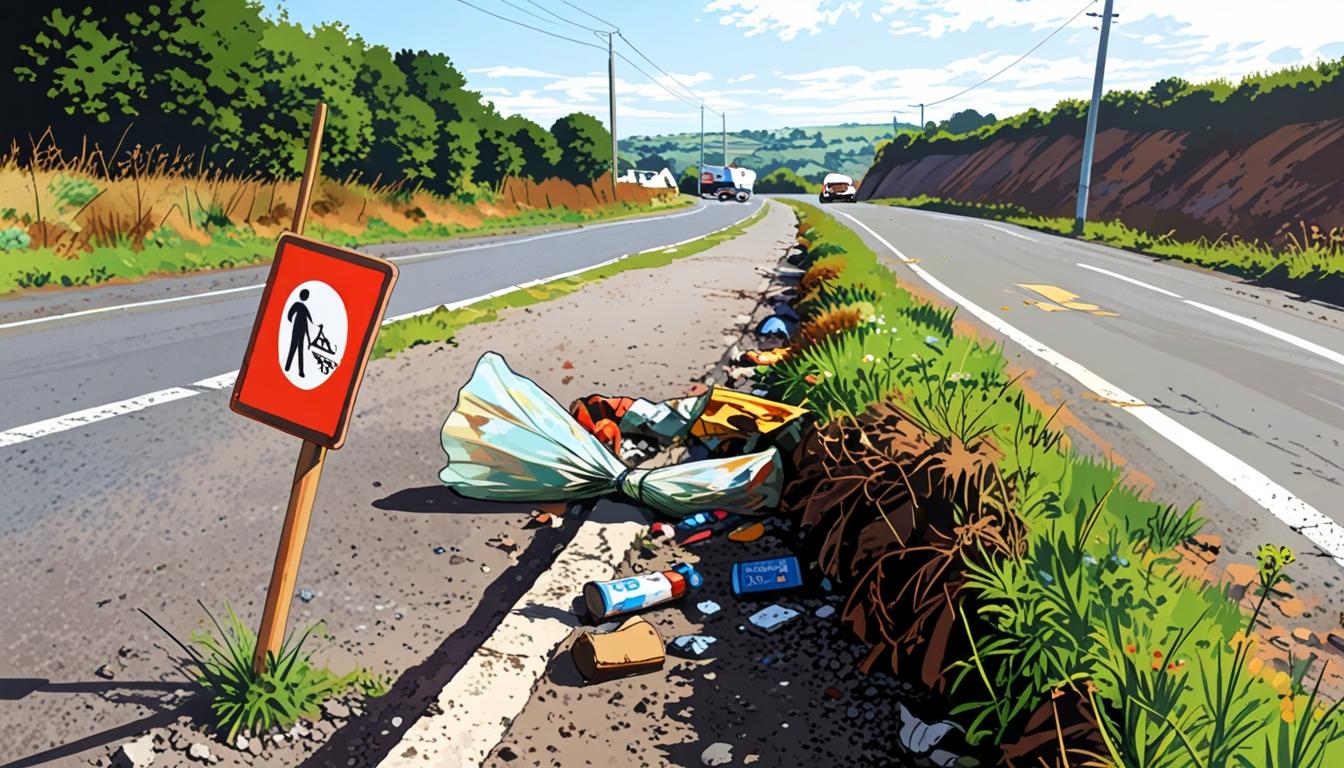Local councils in south Wales face difficulties enforcing anti-littering laws due to a lack of specific legislation, operational costs, and environmental policies affecting verge maintenance. Efforts include lobbying the Welsh Government for stronger powers and exploring new initiatives such as signage and deposit return schemes.
Concerns over roadside litter in parts of south Wales have highlighted challenges faced by local councils in enforcing anti-littering laws and maintaining cleanliness along busy roads. Monmouthshire County Council’s highways chief, Carl Touhig, has provided insight into the difficulties the council encounters, particularly due to the absence of specific legislation in Wales to prosecute motorists who throw litter from their vehicles.
During a briefing to Monmouthshire councillors on local highways issues, Mr Touhig explained, “In Wales we don’t have legislation that we can prosecute car drivers for throwing litter which makes it difficult to enforce.” He contrasted this with the situation in England, where such laws are in place, stating, “It does help in England. The risk of getting caught is a deterrent.”
This legislative gap has prompted councils to lobby the Welsh Government to provide authorities with powers to bring prosecutions against offenders. Mr Touhig also expressed optimism that forthcoming plans for a deposit return scheme aimed at bottles could help reduce waste by incentivising the public to return containers rather than discard them.
In addition to legislative challenges, the practicalities of clearing litter from key transport routes present further obstacles. Trunk roads, while managed by the Welsh Government, are supported operationally by the South Wales Trunk Road Agency (SWTRA), a body for which Monmouthshire Council serves as an agent. According to Mr Touhig, clearing rubbish from these major roads is complicated by the requirement to implement traffic management measures during litter-picking activities. “That costs a huge amount of money,” he said. “And we do have to ask them can we close their road to do litter picking.”
Despite the Welsh Government and SWTRA’s responsibility for trunk roads, councils remain charged with litter clearance tasks along these stretches. Mr Touhig has repeatedly pressed the government to consider embedding such litter removal as a core part of trunk road maintenance, highlighting ongoing frustrations.
One unexpected consequence of environmentally driven policy changes includes the effect of reduced verge mowing. Mr Touhig explained that whereas verges were previously cut three or four times annually, mowing is now limited to once a year to benefit nature and biodiversity. However, this shift has unintentionally allowed litter to accumulate. As he put it, “It’s excellent for nature and biodiversity but terrible for litter.”
Currently, litter is collected on the verges annually, with additional “safety cuts” carried out as needed. Crews endeavour to clear litter before mowing, yet some debris remains densely buried, which can be shredded during the cutting process—a visual effect Mr Touhig admitted can appear worse.
Efforts to maintain cleanliness are bolstered by volunteer litter pickers who operate within the county. While the council prefers these volunteers to focus on urban areas to enable council workers to manage more rural lanes and country roads, Mr Touhig recognised many volunteers live in outlying areas and prefer to clear litter near their homes.
Over the border in neighbouring Torfaen, awareness of roadside litter issues has also led to potential solutions being considered. Blaenavon independent councillor Nick Horler proposed that road signage be installed alongside roads to warn motorists that discarding litter from vehicles and fly-tipping is illegal. Council leader Anthony Hunt indicated the suggestion “could be considered” by the borough council and promised to keep Cllr Horler updated on progress.
The South Wales Argus is reporting these developments, highlighting ongoing efforts by local councils to improve litter management while navigating legislative and operational challenges.
Source: Noah Wire Services
- https://envirotecmagazine.com/2023/10/18/project-using-tech-and-ai-to-track-litter-on-glasgow-and-cardiff-roads-suggests-new-approach-needed-by-authorities/ – This article highlights the challenges of roadside litter in Wales and the use of technology to identify and address litter hotspots, which supports the broader context of litter management challenges in the region.
- https://keepwalestidy.cymru/blog/packaging-littered-on-64-of-streets-in-wales/ – This report covers the prevalence of litter, particularly packaging, on streets across Wales, underscoring the scale of the litter problem faced by local councils.
- https://www.gov.wales/sites/default/files/publications/2020-01/composition-analysis-of-litter-waste-in-wales.pdf – This document provides an analysis of litter waste composition in Wales, reinforcing the idea that food and drink packaging is a significant contributor to litter, aligning with concerns about roadside waste.
- https://keepwalestidy.cymru/caru-cymru/issues/roadside-litter/ – This webpage discusses the environmental and aesthetic impacts of roadside litter in Wales, consistent with concerns raised by Monmouthshire County Council about maintaining cleanliness.
- https://hubbub.org.uk/tidy-roadsides – This initiative highlights efforts to tackle roadside litter through technology and community engagement, mirroring the approaches councils might consider to enhance litter management.
Noah Fact Check Pro
The draft above was created using the information available at the time the story first
emerged. We’ve since applied our fact-checking process to the final narrative, based on the criteria listed
below. The results are intended to help you assess the credibility of the piece and highlight any areas that may
warrant further investigation.
Freshness check
Score:
9
Notes:
The narrative does not appear to reference outdated information or events known to have occurred long ago. However, it lacks specific recent dates, which might affect its timeliness.
Quotes check
Score:
8
Notes:
The narrative includes quotes from Carl Touhig and other officials without clear references to original sources or dates, which could indicate they are primary sources or recent statements not previously reported.
Source reliability
Score:
8
Notes:
The narrative originates from a reputable news outlet (South Wales Argus) known for covering local issues, which generally enhances reliability. However, without direct links to primary sources for all quotes, there’s a slight uncertainty.
Plausability check
Score:
9
Notes:
The claims regarding legislative gaps in Wales compared to England are plausible and highlight common challenges faced by councils in maintaining road cleanliness. No evidence contradicts these assertions.
Overall assessment
Verdict (FAIL, OPEN, PASS): PASS
Confidence (LOW, MEDIUM, HIGH): HIGH
Summary:
The narrative appears to be recent and well-placed within a reliable news context, addressing current challenges and legislative differences between Wales and England. The quotes seem primary and not recycled from older articles, further supporting the conclusion that the content is fresh and plausible.













